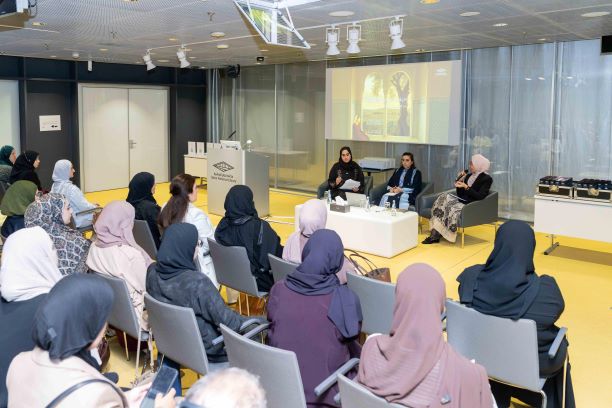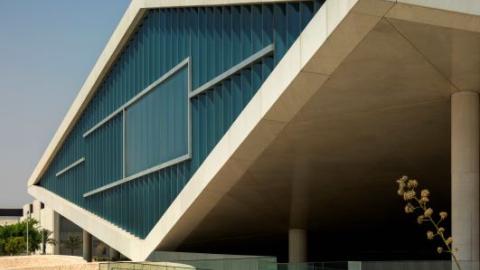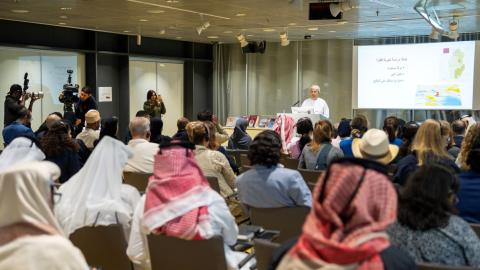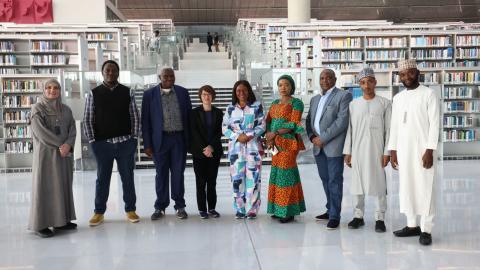
Qatar National Library brought together scholars to explore the often overlooked yet vital role women have played in shaping cultural and social ties amid some of the Islamic world’s most significant upheavals. The event underscored the pivotal contributions of women to cultural preservation and identity formation from the Arab East to the Arab West.
Held on October 7 under the theme “Women in Al-Andalus and Palestine: From Marginalization to Influence,” the panel went beyond traditional narratives of trade and scholarship to highlight the critical social bonds women forged across Al-Andalus, the Maghrib, and the Mashriq. Panelists examined how women reinforced social cohesion during historic crises, including the fall of Al-Andalus and the Palestinian Nakba of 1948.
"At QNL, we are committed to preserving and disseminating our cultural heritage,” said Ikhlas Ahmed, Engagement Specialist at the heritage library“ This panel sheds essential light on the profound contributions of women in bridging cultures and preserving identity across the Arab world. Their central role in the social fabric of our region underscores the vital impact women have on society."
Drawing parallels between the experiences of Andalusian women and contemporary Palestinian realities, the discussion highlighted the enduring resilience of Palestinian women, particularly in the context of the current situation in Gaza.
The panel explored how women cultivated values of steadfastness and sacrifice, emerging as pillars of resistance and guardians of collective memory despite enduring displacement, marginalization, and loss.
The panel featured Dr. Fadwa El-Haziti, Professor of Higher Education at Hassan II University in Casablanca and an expert in cross-cultural and post-colonial studies, and Dr. Basma Dajani, Professor of Arabic Language and Literature at the University of Jordan, renowned for her research on women patrons in Arab-Islamic civilization.
Dr. Fadwa Al-Haziti said the seminar focuses on Arab and Muslim women throughout history with particular emphasis on the experiences of Andalusian and Palestinian women. “Our nation has faced challenges throughout its history similar to those we face today, such as the post-Andalusian period. This discussion aims to highlight the reality of Palestinian women, affirm their right to preserve their memory and identity, and shed light on their suffering under occupation, including violence, siege, famine, and genocide."
"Invoking Andalusia in the context of Palestine is not about making comparisons, but about reflection and broadening perspectives. From this perspective, we explore the shared experiences of Andalusian and Palestinian women, with a focus on their influence and marginalization. The primary goal of this gathering is to reinforce awareness of the Palestinian cause, not only in terms of supporting the Palestinian people, but also recognizing that Palestine’s struggle is central to the Arab and Islamic world," she added.
Dr. Basma Dajani said the seminar comes at a critical time, providing a platform for Palestinian women’s voices and their role in bridging the East-West divide. “At a time when moral values are eroding, Gaza, with its women and children, serves as a moral compass, reminding us that belief in truth, commitment to homeland, and preservation of dignity are at the core of our humanity. When dignity is stripped away, life itself loses its justification. Thus, revisiting pivotal moments in our Arab-Islamic history is not a retreat into the past, but a call for resilience, collective action, and cultural responsibility to confront the ongoing genocide in occupied Palestine and to ensure that humanity and dignity remain at the forefront of global consciousness."
The panelists urged renewed recognition of the ethical and educational values that women instill in society as living embodiments of steadfastness.







